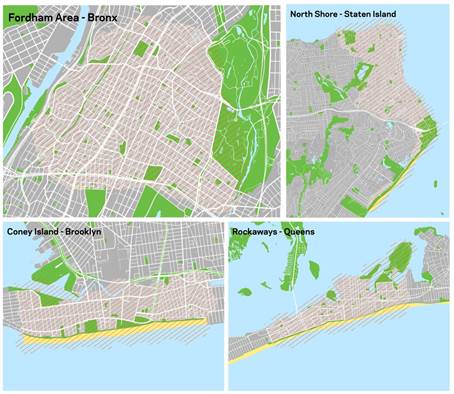The city plans to launch dockless bike-share pilots in Coney Island, the Rockaways, Staten Island's North Shore, and the area surrounding Fordham University in the Bronx, Mayor de Blasio announced today.
Each new bike-share zone will be small in scope, with no more than 200 bikes. The city says data from the pilot projects will inform future bike-share policy decisions going forward.
"We will start in July on a small scale in each borough outside Manhattan, and we will take what we learn over the next few months to make informed, clear-eyed decisions as to whether New York City’s bike-share future is dockless," DOT Commissioner Polly Trottenberg said in a statement.
The agency plans to select participating companies from a pool of 12 applicants next month. While the pilot zones won't be large enough to assess how dockless bike-share services function at scale in NYC (the combined fleet for each area will be capped at 200 bikes), the city will be looking to evaluate "the safety, availability and durability of the bikes" and how well each company complies with "requirements around data accessibility and user privacy."
The services are expected to launch in July, with trips limited to the geography of the pilot zones. In the fall, DOT will evaluate the companies' performance and decide how to proceed with expansion.
While today's announcement allows de Blasio to check "five-borough bike-share" off his to-do list, 2018 will also be the first year since Citi Bike launched that the city's existing, intensely used bike-share system won't be expanded.
Last year, Citi Bike operator Motivate and City Hall nearly reached an agreement to expand the network by 50 percent, including a significant service area in the Bronx, but never sealed the deal. De Blasio reportedly balked because he didn't want bike-share stations to replace on-street parking spots, according to a source familiar with the negotiations.
Bike-share depends on network effects to be useful. Systems gain capacity the more extensive and densely packed with bicycles they are.
An expansion of the Citi Bike service area into contiguous neighborhoods would create vastly more transportation value for New Yorkers than a handful of small, isolated pockets of dockless bike-share. Even if the city gains useful information from the pilot bike-share zones that informs future policies, the fact is that City Hall has allowed a very useful system with a proven track record to stagnate.






